President Tsai Ing-wen (蔡英文) yesterday pledged to defend the nation’s sovereignty and democracy amid “unprecedented challenges” brought by China’s increasing military coercion, and to ensure Taiwan would not be forced to take the path China has laid out for it.
Tsai in her Double Ten National Day speech reiterated Taiwan’s determination to defend itself, and maintain regional peace and stability, which she said is being challenged by China’s increasing military coercion in the South and East China seas, as well as in the Taiwan Strait.
Reiterating her Democratic Progressive Party’s stance on cross-strait relations, Tsai said her administration’s goodwill toward Beijing would not change.
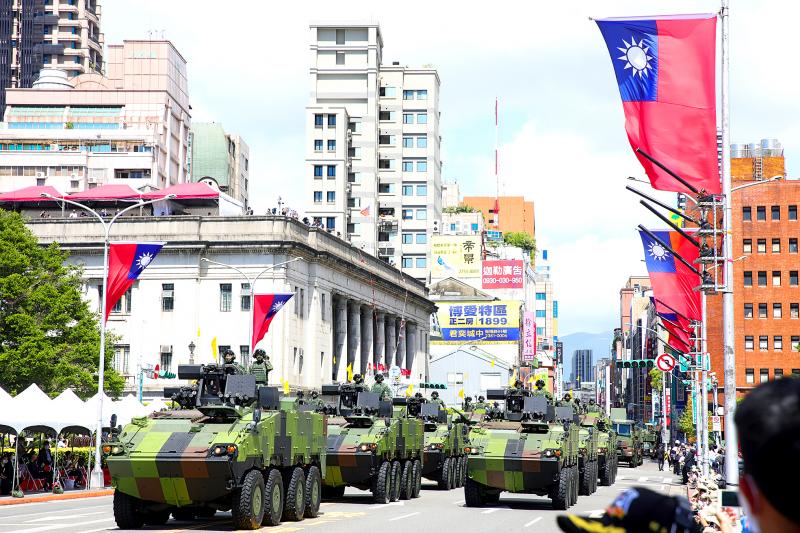
Photo: I-Hwa Cheng, Bloomberg
The government would continue to do its part to prevent the cross-strait “status quo” from being changed unilaterally, she said.
However, resolving cross-strait differences “requires the two sides of the Strait to engage in dialogue on the basis of parity,” she added.
Taiwan would not act rashly and will do its best to ease tensions, she said, adding that “there should be absolutely no illusions that Taiwanese will bow to pressure.”
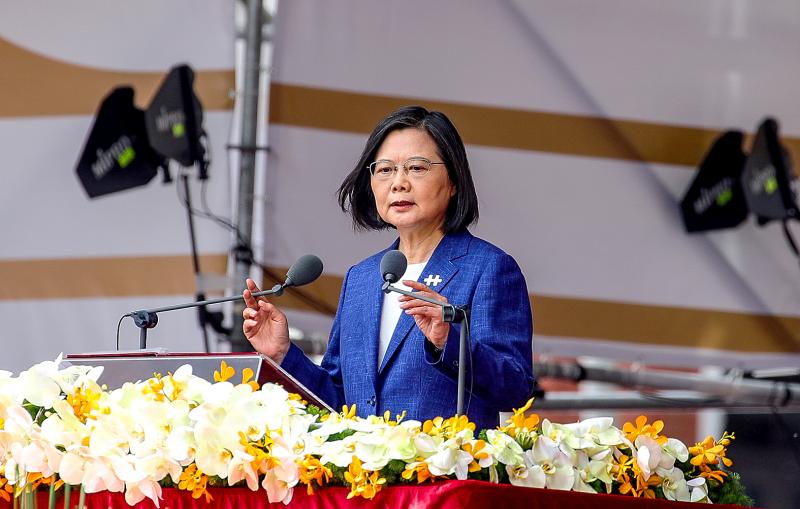
Photo: I-Hwa Cheng, Bloomberg
“We will continue to bolster our national defense, and demonstrate our determination to defend ourselves and to ensure that nobody can force Taiwan to take the path China has laid out for us,” she said. “This is because the path that China has laid out offers neither a free and democratic way of life for Taiwan, nor sovereignty for our 23 million people.”
Tsai laid out four commitments that she said should serve as common ground for all Taiwanese, regardless of their political affiliations, in remarks apparently directed at Chinese Nationalist Party (KMT) Chairman Eric Chu (朱立倫), Taiwan People’s Party Chairman Ko Wen-je (柯文哲) and New Power Party Chairwoman Chen Jiau-hua (陳椒華), who also attended the ceremony.
“Let us here renew with one another our enduring commitment to a free and democratic constitutional system, our commitment that the Republic of China and the People’s Republic of China should not be subordinate to each other, our commitment to resist annexation or encroachment upon our sovereignty, and our commitment that the future of the Republic of China [Taiwan] must be decided in accordance with the will of Taiwanese,” Tsai said.
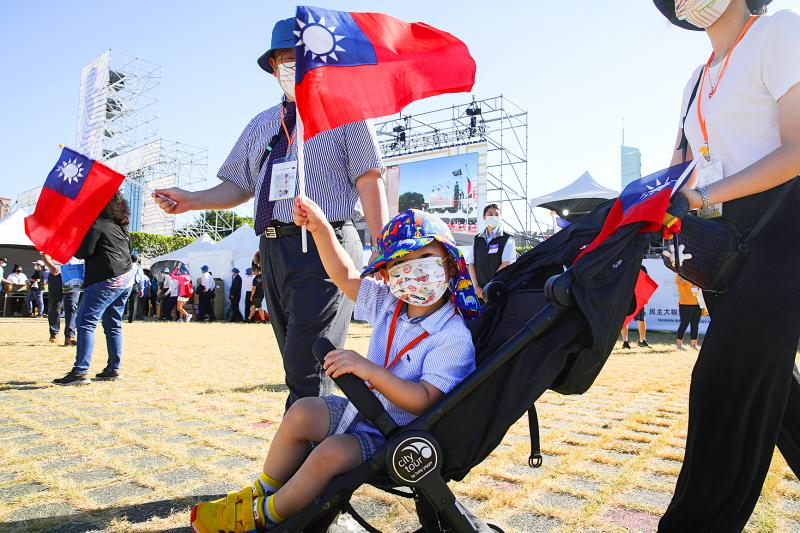
Photo: I-Hwa Cheng, Bloomberg
“On the basis of this shared foundation, we have a responsibility to seek an even broader consensus, so that we can be united in the face of future challenges,” she said.
Tsai also thanked Japan, the US, Lithuania, Slovakia, the Czech Republic and Poland for their donations of COVID-19 vaccines, even though the COVID-19 pandemic continues and vaccines are in short supply.
The nation’s donations of masks to countries worldwide last year showed that Taiwan can help, Tsai said, adding that “the vaccines they sent us this year are vaccines of friendship.”
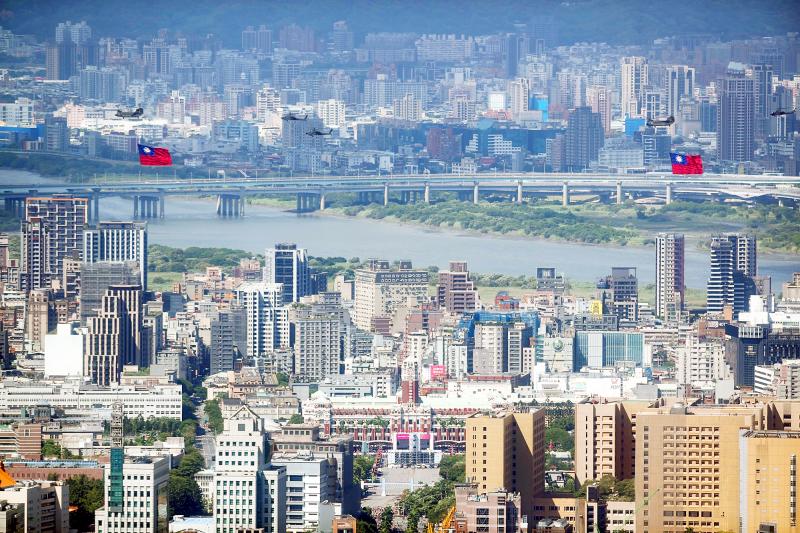
Photo: CNA
“This is a virtuous cycle, and I can assure the international community that Taiwan will continue to contribute to the world and expand this virtuous cycle,” she said.
Although the pandemic hurt domestic consumption, it did not affect Taiwan’s overall economic growth prospects, Tsai said.
In particular, a global shortage of semiconductors has highlighted Taiwan’s importance in global supply chains, she said.
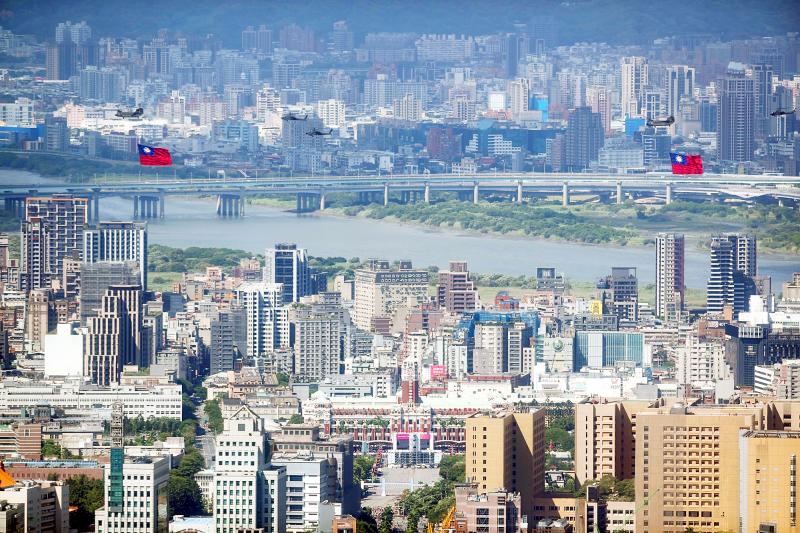
Photo: CNA
The world has begun to pay attention to Taiwan’s key position in the region, she added.
The nation’s determination to expand trade ties with major partners has been demonstrated by the resumption of Taiwan-US Trade and Investment Framework Agreement meetings, and its application to join the Comprehensive and Progressive Agreement for Trans-Pacific Partnership, Tsai said.
“We believe we have the ability to work with like-minded partners to contribute to the international community. Taiwan today is no longer seen as the orphan of Asia, but as an island of resilience that can face challenges with courage,” she said.

‘DANGEROUS GAME’: Legislative Yuan budget cuts have already become a point of discussion for Democrats and Republicans in Washington, Elbridge Colby said Taiwan’s fall to China “would be a disaster for American interests” and Taipei must raise defense spending to deter Beijing, US President Donald Trump’s pick to lead Pentagon policy, Elbridge Colby, said on Tuesday during his US Senate confirmation hearing. The nominee for US undersecretary of defense for policy told the Armed Services Committee that Washington needs to motivate Taiwan to avoid a conflict with China and that he is “profoundly disturbed” about its perceived reluctance to raise defense spending closer to 10 percent of GDP. Colby, a China hawk who also served in the Pentagon in Trump’s first team,

SEPARATE: The MAC rebutted Beijing’s claim that Taiwan is China’s province, asserting that UN Resolution 2758 neither mentions Taiwan nor grants the PRC authority over it The “status quo” of democratic Taiwan and autocratic China not belonging to each other has long been recognized by the international community, the Mainland Affairs Council (MAC) said yesterday in its rebuttal of Beijing’s claim that Taiwan can only be represented in the UN as “Taiwan, Province of China.” Chinese Minister of Foreign Affairs Wang Yi (王毅) yesterday at a news conference of the third session at the 14th National People’s Congress said that Taiwan can only be referred to as “Taiwan, Province of China” at the UN. Taiwan is an inseparable part of Chinese territory, which is not only history but

CROSSED A LINE: While entertainers working in China have made pro-China statements before, this time it seriously affected the nation’s security and interests, a source said The Mainland Affairs Council (MAC) late on Saturday night condemned the comments of Taiwanese entertainers who reposted Chinese statements denigrating Taiwan’s sovereignty. The nation’s cross-strait affairs authority issued the statement after several Taiwanese entertainers, including Patty Hou (侯佩岑), Ouyang Nana (歐陽娜娜) and Michelle Chen (陳妍希), on Friday and Saturday shared on their respective Sina Weibo (微博) accounts a post by state broadcaster China Central Television. The post showed an image of a map of Taiwan along with the five stars of the Chinese flag, and the message: “Taiwan is never a country. It never was and never will be.” The post followed remarks

INVESTMENT WATCH: The US activity would not affect the firm’s investment in Taiwan, where 11 production lines would likely be completed this year, C.C. Wei said Investments by Taiwan Semiconductor Manufacturing Co (TSMC, 台積電) in the US should not be a cause for concern, but rather seen as the moment that the company and Taiwan stepped into the global spotlight, President William Lai (賴清德) told a news conference at the Presidential Office in Taipei yesterday alongside TSMC chairman and chief executive officer C.C. Wei (魏哲家). Wei and US President Donald Trump in Washington on Monday announced plans to invest US$100 billion in the US to build three advanced foundries, two packaging plants, and a research and development center, after Trump threatened to slap tariffs on chips made